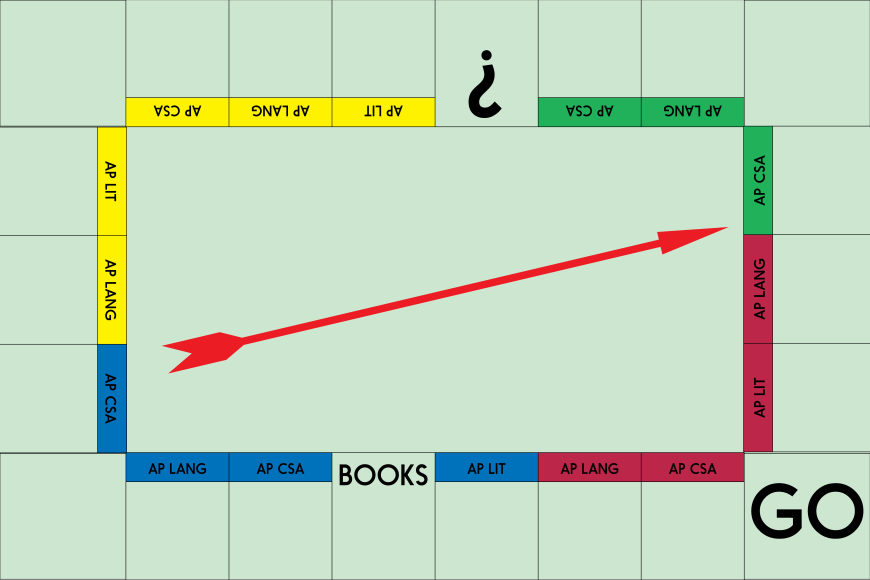Pass October, pay $200
The College Board’s policies often prioritize making a profit over helping prepare students for success in college.
The College Board abuses their monopoly over college credit in high school.
There’s a joke in my friend group that one of my friends is a College Board whale, or a customer who is routinely high-paying. They’re the College Board’s perfect consumer: willing to take the SAT over and over again to inch towards perfection 10 points at a time and suffer through $100 AP test after $100 AP test. But why does the College Board need these kinds of consumers? It seems like, despite being a nonprofit organization whose mission is “to connect students to college success and further opportunity,” many of the College Board’s policies are more in line with connecting students’ bank accounts to their own.
Unlike the title suggests, nonprofit organizations, such as the College Board, are welcome to make plenty of profit. However, in order to maintain their tax-exempt status, earnings can only be given to individuals as salaries and cannot be used to promote private interests or political parties. These guidelines don’t prevent the College Board from maximizing its profit to pad the pockets of its executives — CEO David Coleman made $1,418,038 in 2019, compared to $181,739, the average salary for CEOs of nonprofit organizations — and further their chokehold on the market for getting college credit in high school.
The first exploitative policy I have noticed is putting the exam registration deadline in November. Only two to three months into the class, students have to decide if they will do well enough on the AP test to justify paying for it. Sure, there’s late registration, but that adds an extra $40 to your order. On the other hand, if you want to cancel an exam, you don’t even get a full refund. You still have to pay $40 for daring to think you wanted to take the test.
At first, I gave the College Board the benefit of the doubt. Maybe they do need seven months to prepare for the exact number of students taking the test. However, the AP exam registration deadline used to be in March until 2018; there is no logistical reason to make students register so early. The College Board claims the switch was motivated by a pilot program conducted in 2017 that found the new deadline increased low-income student registration by 33%. However, only 23.6% of the additional low-income students scored a three or higher. If the College Board truly seeks to help low-income students, shouldn’t they also offer a full refund? This would keep the benefits of increased low-income student registration while avoiding trapping unprepared people into taking an AP test. Instead, the current policy prioritizes the amount of revenue the College Board earns.
Another predatory practice of the College Board is charging students if they decide to send their SAT and AP scores to colleges. Apparently, simply paying to take the tests isn’t enough; you also have to pay to get the test results into the hands of colleges. While self-reporting has recently become an accepted option during the application stage, upon enrolling in a university, students will have to pay to have their official scores sent. These $12 and $15 costs are really just hidden parts of the price to take the SAT or AP tests. There are four free score reports available for the SAT, but you have to choose to send these before you know your score. The College Board can afford to send our scores to a few schools for free, but they want to make money off of students who are too anxious to send their scores without knowing what they are yet. The free AP score report is slightly better, considering it can be used at any time, but it only allows you to send your report to one school per year.
The College Board gets away with these practices because it holds a monopoly on getting college credit in high school. AP tests, while not the only college credit option, are definitely the most popular choice. The International Baccalaureate, which provides programs for juniors and seniors to take a more rigorous course of study to potentially earn college credit, is only available at 7% of secondary schools in the U.S. In the ICCSD, students have a few other options for college credit, such as PSEO classes at the University of Iowa or Kirkwood Community College; I encourage people to try them instead of taking another AP class. However, many students in other districts likely don’t have these options, and even here at West, they can be inaccessible due to transportation issues. Unfortunately for us, it seems like the College Board has both Boardwalk and Park Place. All we can do is hope they don’t start building hotels.
Your donation will support the student journalists of West High School. Your contribution will allow us to purchase Scholarship Yearbooks, newsroom equipment and cover our annual website hosting costs.

(she/they) Rosemary is a senior at West High. While this is her third year on staff, it is her first year as the print opinion editor. When she is not...



